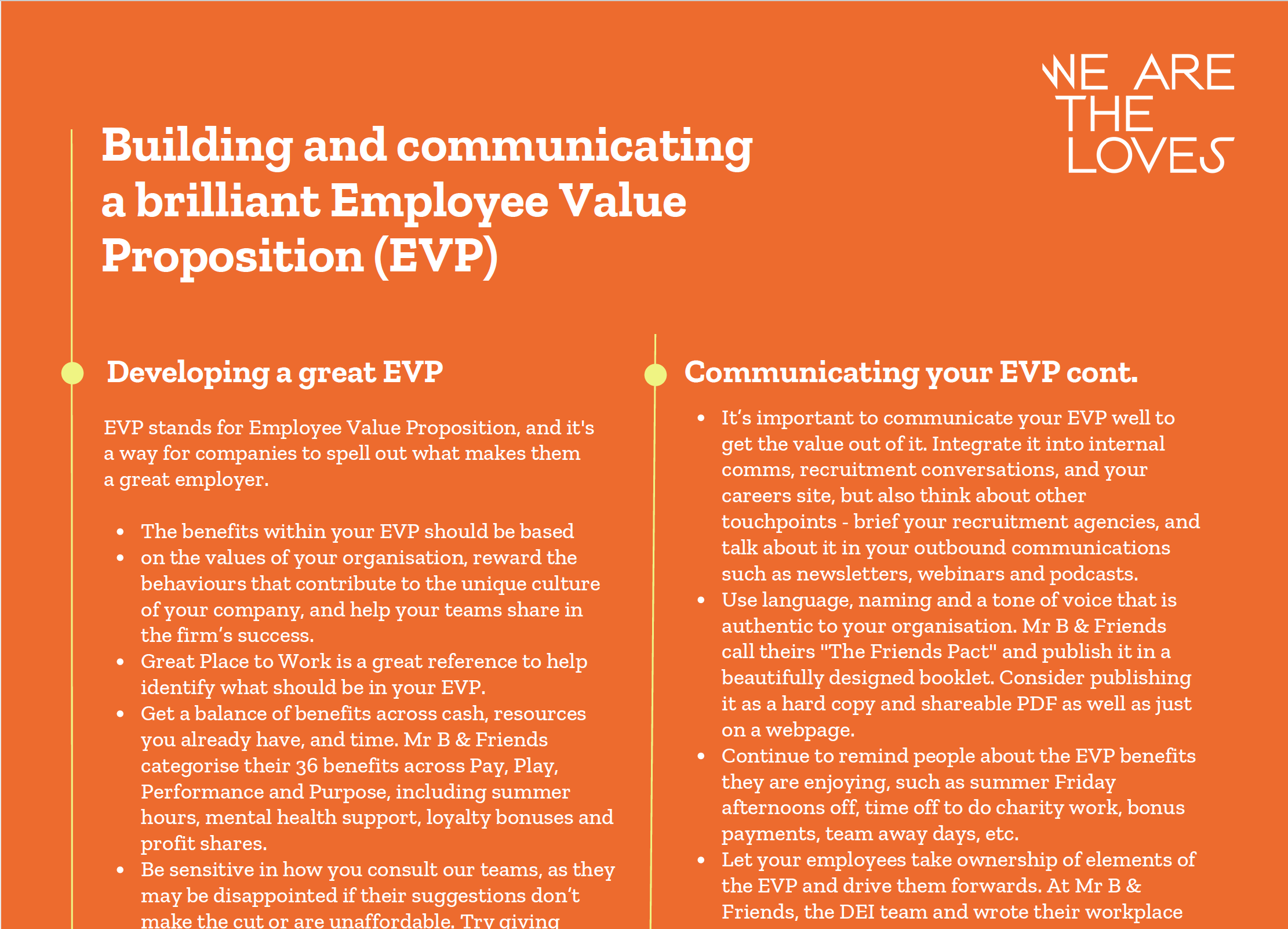What is employer branding in HR and recruitment?
All you need to know about how employer branding helps in recruitment and across the whole employee lifecycle.
By Emma Wharton Love, Strategy Director at We are The Loves
Organisations face a significant, ongoing challenge: how can we truly set ourselves apart to attract the industry's top talent and retain them for long-term success? In the highly competitive field of talent acquisition, effective employer branding and an employee experience that follows through on the promises at recruitment is key to standing out from the crowd.
Here we explain everything you need to know about employer branding to attract, inspire and retain your top talent.
Why is employer branding important?
Employer branding refers to an organisation's reputation as an employer, and its value proposition to its employees, as opposed to its more general corporate brand reputation and value proposition to customers. The term "employer branding" is often used to discuss a company's reputation in the job market and how it's perceived as a place to work.
In practice, employer branding involves promoting the company as a great place to work, in order to attract, recruit, and retain high-quality employees. This can involve a variety of strategies and tactics, from showcasing the company's values and culture, to offering competitive benefits and opportunities for growth and development.
Strong employer branding can help a company attract better candidates, reduce hiring and marketing costs, and increase productivity by boosting employee engagement and satisfaction.
What are the essential pillars of employer branding?
Defined as the perception of the organisation as a great place to work by both employees and potential candidates, your employer brand is a vital asset in securing the high-calibre talent that drives the success of your firms. Here we'll explore the essential pillars of employer branding, expanding on the many buzzwords you will have heard, with a particular focus on advice for professional services firms.
Company culture
The cornerstone of any employer branding strategy is the company culture. In professional services firms, where collaborative problem-solving and client engagement are key, culture can be a powerful tool in attracting and retaining the right people. Transparency about your company culture, demonstrated through mediums such as videos and social media posts, can ensure your firm appeals to the right talent.
Employee value proposition (EVP)
This is what sets a company apart from its competitors as an employer. EVP is a unique set of values, benefits, and experiences a company offers in return for the skills and experience the employee brings. For professional services firms, an EVP might include elements such as competitive salaries, comprehensive benefits packages, continuous learning opportunities, and clear paths for career progression, alongside ways of working, mental health support, community and social activities and so on.
The best EVPs are co-produced with staff - so the benefits offered really do add value to people’s everyday working lives. For instance, some people think that different age groups in the workplace would want different things from an EVP - but we did some research finding that’s not so true. Yes, the softer aspects of a company’s employer brand are the most important to attracting younger talent— a diverse and inclusive workplace, a strong sense of culture, and a commitment to sustainability to name a few, but these are also just as important to Gen X.
Your EVP should reflect your unique culture and values and reinforces the behaviours you want to perpetuate in the workplace. For many businesses the EVP is the key differentiator from the competition.
Lastly, don’t think of your EVP as something you do, tick off the list and dust off the shelf every decade. It’s a live document that keeps pace with the needs of the organisation and your people - reflecting the type of people you employ and what you stand for as a company.
Employer reputation
Your reputation as an employer can significantly impact your ability to attract and retain talent. This is particularly true for professional services firms such as management consultancies and law firms, where employer reputation can play a major role in differentiating yourself from other firms.
Candidate experience
From the initial job ad to the final interview and onboarding, the candidate experience plays a vital role in shaping your employer brand. Ensuring a positive candidate experience can help professional services firms stand out from the crowd and boost their employer brand.
Employee experience
The employee experience encompasses all interactions an employee has with your firm, from the day-to-day work environment to resources, tools, and the growth opportunities provided. For professional services firms, creating a positive employee experience that resonates with the talent you are seeking to retain and attract is integral to maintaining a strong employer brand.
Employee engagement
Employee engagement refers to the emotional commitment an employee has towards the organisation and its goals. High engagement levels are correlated with increased productivity and loyalty, two factors that are especially important for professional services firms where long-term client relationships and project outcomes are key.
Employee advocacy
Employee advocacy involves your employees actively promoting your organisation as a great place to work. When your employees share their positive experiences on social media or through word-of-mouth, they act as brand ambassadors, extending your reach and improving your reputation as an employer. Advocacy is also one of the most cost effective ways to reach your target audience and the foundation stone of it is happy and engaged employees.
In summary
Understanding and implementing these pillars of employer branding can give professional services firms, including management consultancies and law firms, a distinct edge in attracting and retaining top talent. Employer branding agencies can help firms craft an authentic, resonant brand that appeals to their ideal candidates.
An effective employer brand isn't just a tool for recruitment; it forms the foundation for a satisfied, engaged workforce contributing to your firm’s success.
Check out our guide on how to build your EVP —
See an example from award winning law firm TLT —
How can employer branding be measured?
Effective employer branding requires regular monitoring and improvement. Companies should measure key metrics such as the number of quality applicants, time to hire, employee retention rate, and brand sentiment among employees and job seekers.
Surveys and feedback tools can be used to understand employees' perceptions of the employer brand. Social listening tools can provide insights into how the brand is perceived by external audiences.
Hang on, I thought employer branding was all about snazzy design?
Employer branding is a vital part of any company's marketing and recruitment strategy. The process involves creating and managing an organisation's reputation as an employer to attract, engage, and retain talented individuals.
Effective communication is the cornerstone of any successful employer branding strategy. It involves conveying the company's values, culture, and work environment to potential and existing employees. There are several ways to achieve this:
Employee value proposition (EVP)
We wrote about this earlier, but to recap, EVP communicates what makes the organisation unique as an employer and what it offers to its employees in terms of career development, compensation, work-life balance, and culture. It should be articulated clearly and consistently internally and externally, and kept as a live document. The most effective EVPs are created bottom-up through employee engagement, so the creation and refreshing of an EVP is an internal engagement tool in itself. Win-win!
The EVP document can be just that - a beautiful document - conveying your brand values within its design - or it can be a website, a video, a vlog. Or all of these. The world’s your oyster - as long as it is consistent with your values and culture and the media you choose is what will resonate most with your audience. Large organisations will need to produce their EVP in a range of formats so it resonates with the diverse audiences within their organisation.
Recruitment websites
Creative content on recruitment websites can be a powerful tool to capture attention, communicate the employer brand, and engage potential candidates. This could include behind-the-scenes videos of a day in the life at the company, employee testimonials, or interactive content such as quizzes or games that align with the company's culture and values. A visually compelling, well-designed site with engaging and authentic content can leave a lasting impression and give potential employees a strong sense of the organisation's culture.
Using infographics and other visual content to showcase the benefits, growth opportunities, or the positive impact of the company's products or services can help potential candidates better understand the company's value proposition. Interactive job descriptions, which could include videos of team leaders or colleagues discussing the role, can also be more engaging than traditional written descriptions.
Moreover, regular blog posts on industry trends, company news, or thought leadership can position the organisation as an expert in its field and make it more attractive to potential candidates who want to work at the forefront of their industry.
Finally, user-generated content, like employee-generated blogs or videos, can provide authentic insights into the company culture. This kind of content can help potential candidates envision themselves as part of the team and foster a sense of connection even before they apply for a position.
Social media
Platforms like LinkedIn, Facebook, Twitter (or X!) can be used to share updates, job postings, and employee testimonials. Instagram and TickTok, on the other hand, can provide a more informal look into day-to-day company life, which today’s younger candidates are looking for to give them confidence that what a company is saying about itself is really true.
Sharing blogs, videos, or podcasts about the company's culture, achievements, events, and people can engage potential and existing employees and build an attractive employer brand.
Authentic storytelling across external communications
Social media platforms, the company's website, job boards, and public relations efforts are all avenues to convey the employer brand to prospective hires. Companies should use authentic storytelling and engaging content to give a realistic glimpse into the company's culture and work life. Check out our framework for storytelling.
Check out all our latest insights and thinking on EVP and more —
Learn how to use storytelling in your employer brand —
Why work with an employer branding agency?
Working with an Employer Branding Agency can result in substantial financial benefits for management consultancies and law firms. A well-crafted employer brand can reduce cost-per-hire by up to 50%, according to LinkedIn. Furthermore, organisations with a strong employer brand see a decrease in turnover rates by 28% and a significant increase in employee engagement, which can lead to a 19% increase in revenue according to a study by Harvard Business Review. This means that the upfront investment in partnering with an employer branding agency can pay dividends in the long run by attracting high-quality talent, reducing hiring costs, improving retention rates, and ultimately, driving greater business growth and profitability. But the most important benefit is more engaged, happier, more motivated people.
Could you do with a little friendly advice?
More Employer Branding Insights
Employer branding examples
Targeted recruitment film and brand storytelling conveying the unique values and behaviours of the fast-growing management consultancy Q5.
Photography showcasing the variety of careers on offer through Unilever’s graduate recruitment programme.
Developing a hybrid working EVP strategy and employee engagement campaign for the organisation behind our democratically elected house of the UK Parliament.












